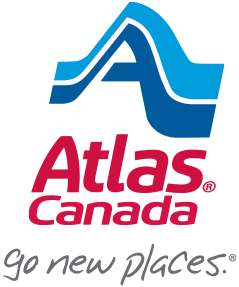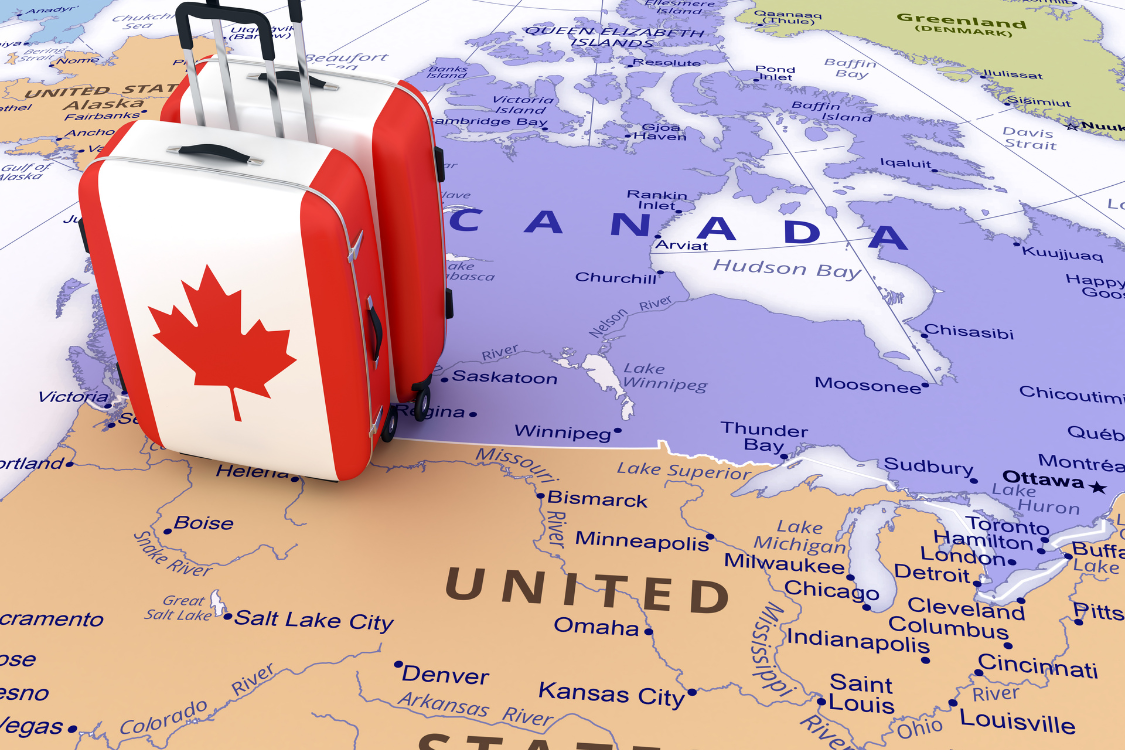In today’s security-conscious world, moving from Canada to the United States has become a more complex process than ever before. At Atlas, we’ve invested the time, resources, and expertise necessary to stay up-to-date with the latest regulations and procedures to ensure full compliance. Each year, we successfully manage thousands of shipments to the United States, and as industry leaders, you can trust us to handle your move smoothly and without issues.
As your dedicated van line, we are here to guide you through every step of your relocation and clarify the requirements for a successful move. Part of your responsibility includes providing the necessary personal documentation required by US Homeland Security and US Border Protection Services, ensuring your belongings can enter the United States duty-free.

Personal Documentation Requirements
Step One:
Form 3299: Declaration for Free Entry of Unaccompanied Articles
You are required to complete a US Department of Homeland Security, “3299 Declaration for Free Entry of Unaccompanied Articles” form. You can complete the form online by going to www.cbp.gov and typing “3299 form” in the search box.
Note:
Shipments Placed “In Bond”
In rare instances when paperwork is not submitted correctly, US Customs and Border Services will place your shipment “in bond” at their discretion. You will then have to appear in person at a customs facility at destination to clear your shipment. If you are not available, the mover will be instructed by US Customs to place your shipment in storage at a “bonded warehouse”, thus accruing additional charges for you.
Step Two:
The personal documentation required by Homeland Security/US Border Protection Services varies slightly depending on your status.
Non-Resident on a Work/Study/Investor Visa
• Customer’s Passport – Copy of passport for each accompanying family member
• Copy of Work Visa (one of: TN, L1, HB1, HB2, EB2, EB3, Student F1, etc.)
• Offer of Employment Letter (without confidential information)
• Copy of Visa Validation Stamp (found in passport)
• Copy of I-94 form (you must cross into the US before your goods arrive to obtain this form)
• Copy of Marriage Certificate if spouses have different last names
There Are Three Types of Immigration Status in The US:
• Non-Resident on a Work/Study/Investor Visa
• Returning US Citizen/Resident
• Part-Time Seasonal Resident
Your documentation required will depend on government status.
Returning US Citizen/Resident
- Customer’s Passport – Copy of passport for each accompanying family member
- Provide proof of length of time away from US (copy of stamped work visa is acceptable)
- If you are returning to the US with instruments/tools of your trade previously exported from the US, then include copies of previous inventories as proof they entered duty-free
- Sales receipts for major articles purchased while in Canada – items not owned and used for a minimum of one year will attract duty/tax
Part-Time Seasonal Resident
- Customer’s Passport – Copy of passport for each accompanying family member
- Copy of title to home or lease/rental agreement for US property
- Proof of Canadian residency (title to property, current property tax bill, 4-6 months of utility bills, etc.)
Importing a Motor Vehicle
Any motor vehicle that is less than 25 years old and will remain in the United States for more than one year must meet US Department of Transportation (DOT) safety and EPA standards. In most cases, cars and trucks do not travel on the moving van and other third-party arrangements must be made.
Note:
The following are considered vehicles by the DOT: cars, trucks, buses, ATV, side-by-side, trailers, motorcycles, mopeds, and motorized bicycles.
Required Documentation for Motor Vehicles:
- Copy of Vehicle Ownership
- Copy of Bill of Sale (if vehicle is leased or financed, a letter of authorization from financial institution is required)
- Compliance letter from vehicle manufacturer, not dealer (not needed for recreational vehicles)
- US Department of Homeland Security and CBP Form 3299 – for vehicle only (not required if driving your own
- Form HS-7
- EPA Form 3250-1
Note:
Compliance Letter from Vehicle Manufacturer
Some manufacturers charge a fee to issue a compliance letter or will ask for a copy of your Work Visa. When you receive your letter from the manufacturer, read it carefully. If the letter states that your vehicle complies with FMVSS, “except for minor labeling requirements”, then you will know that your car is acceptable to the US. If the letter states that the vehicle meets all standards, “except for speedometer or headlights”, then you will have to have this work done before the car is taken to the US and a copy of the invoice for the replacements must be included in the paperwork presented to Customs. If the letter states that your vehicle meets all standards, “except for No. 208 automatic or passive restraint requirements”, you will NOT be able to import it on a permanent basis unless it is modified by a registered importer. Generally, the cost for conversion is too expensive to make it worth having it done.
Returning Vehicles Bought From The US
Vehicles previously exported out of the US that are being re-imported by a “returning US
resident” do not require a compliance letter from vehicles manufacturer. You must provide proof that the vehicle was previously registered/ plated in the US (State registration card, title of registration or bill of sale from the dealer).
Financed or Leased Vehicles
Most leasing companies or financial institutions will not permit you to export a vehicle to the United States. Check with your institution and the motor vehicle licensing bureau in the state you are moving to before making any arrangements.
Duties/Taxes
Former US residents can usually import a vehicle purchased in Canada and manufactured under the USMCA agreement on a duty-free basis, providing they have owned it for a minimum of one year. Vehicles made outside of the USMCA zone are generally subject to duty. Check with US customs to determine rate of duty as this is subject to change.
Wine Collections
Movers do not transport wine or liquor on the moving van along with your household goods for safety reasons. A third-party carrier will need to be arranged to handle large quantities or wine collections.
Duties/Taxes
Wine collections are not considered by US Customs and Border Protection to be household goods or personal effects and are therefore subject to state regulated duties/taxes. Some states will permit you to import up to one case of wine duty-free, but others will not. US Customs determines the admissibility according to the regulations in the state where the shipment first enters the United States unless it is shipped “in bond” to your final destination. That means you will pay duties/taxes as determined by that state. The paperwork, and in certain cases the licensing, involved in importing a wine collection is fairly complex and is best left to a Customs Broker who has the necessary experience. A fee will be levied by the broker but it is well worth it, to ensure that your shipment is not seized by CBP. For a listing of the state liquor control authorities go to www.ttb.gov/ wine/state-ABC.shtml.
Firearms And/Or Ammunition
Movers do not transport firearms on the moving van along with your household goods for safety reasons. A third-party licensed gun importer will need to be arranged to properly import these items.
An import application must be sent to the Bureau of Alcohol, Tobacco and Firearms (ATF) a minimum of 8 weeks in advance of the date when you plan to import these items. For full information and copies of the appropriate forms go to www.atf.gov.

Importing Your Family Pets
Dogs
Dogs over the age of three months must be vaccinated against rabies at least 30 days before entering the United States. A valid rabies
vaccination certificate should accompany the animal. It should identify the animal by breed, age, colour and markings, include the date of vaccination and the expiry date. It must be signed by a licensed veterinarian.
Cats
As a general rule there are no restrictions on bringing domestic cats into the United States providing the animal appears to be in good
health. If an inspector wishes, he can insist that the cat(s) be examined by a licensed veterinarian at the owner’s expense. There are no vaccination requirements for cats. However, if they are destined for Hawaii, they will be subject to quarantine requirements.
Turtles, Snakes, Lizards, Hamsters, and Fish.
There are no current restrictions on the importation of these types of pets. Only turtles with a shell length of 4” or less may not be imported for any commercial purpose.
Birds
Pet birds entering the US from Canada, generally require:
- Appropriate U.S. Fish and Wildlife Service (FWS) certifications and permits;
- Health Certificate
- Veterinary Services (VS) import permit
- Examination at the first U.S. port of entry
Exotic Pets and Endangered Species
There are various regulations involved to import more exotic pets or endangered species.
Step One:
Obtain a Canadian export permit through Environment Canada and CITES travel.gc.ca/ travelling/documents/cites-permits.
Step Two:
Apply for a US import permit. Go to www.aphis. usda.gov and choose “imports & exports” then choose “animals”. US Fish and Wildlife Service handle the permits for the export and import of endangered species. Go to www.fws.gov for more information.
Hunting Trophies
Similar to importing exotic or endangered species, the importation of some hunting trophies is also subject to the two-step process
noted above. As described, obtain your Canadian export permit first through travel. gc.ca/travelling/documents/cites-permits. Then obtain your US import permit. Game birds, deer, moose, elk and bison hunting trophies are generally admissible to the US providing they have been prepared by an approved taxidermy facility.

Moving To The United States Contact Information
For Visa Information:
Citizenship and Immigration 1-800-375-5283
Email: USCIS.Canada@uscis.dhs.gov www.uscis.gov
For more personal service and to locate your closest US consulate office go to: www.usembassy.gov
For Customs Information:
US Customs and Border Protection 1-877-227- 5511
www.cbp.gov
For a 3299 form: https://www.cbp.gov/ document/forms/form-3299-declaration-free- entry-unaccompanied-articles
For Motor Vehicle Importation:
National Highway Traffic Safety Association/Department of Transportation 1-888-327-4236 https://www.nhtsa.gov/importing-vehicle
For a DOT HS-7 form: https://www.nhtsa.gov/importing-vehicle
For a 7501 Form: https://www.epa.gov/importing-vehicles-and-engines/epa-standard-form-3520-1-declaration-form-importation-motor-vehicles
Environmental Protection Agency (EPA):
734-214-4100
Email: imports@epa.gov
www.epa.gov/otaq/imports
For an EPA 3520-1 Form: https://www.epa.gov/importing-vehicles-and-engines/epa-standard-form-3520-1-declaration-form-importation-motor-vehicles
For Firearms Importation:
Department of Alcohol, Tobacco and Firearms
(ATF) 1-800-800-3855
Email: imports@atf.gov
www.atf.gov
US Government Official Contact List:
The list of US Government Agencies above can provide you with additional assistance, specific to your person situation, and have forms available for download from their website.






